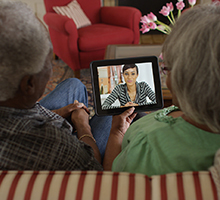Converting to telemedicine in the era of COVID-19
08/04/2020

BAI staff has worked one-on-one with
patients and caregivers to ensure they
are set up for the telemedicine eVisits
ahead of time, helping with downloading
and understanding the technology.
When the new coronavirus known as COVID-19 landed in the United States in early 2020, its first victims seemed to be older Americans living in nursing homes and assisted living settings. The realization that seniors, especially those with underlying health conditions, were highly susceptible to the worst effects of the virus was an alarm bell for the medical team at Banner Alzheimer’s Institute.
They quickly got to work planning alternative ways to care for Alzheimer’s and dementia patients and support caregivers in the safest way possible. The result was a series of programs and services provided by telemedicine and online meeting technology.
“We quickly realized we needed to pivot our focus to caring for patients remotely so they could remain safe in their homes during the pandemic,” said Lori Nisson, BAI Director of Family and Community Services. “We started with wellness calls to all our patients and caregivers to check in with them, see how they were managing and address their current needs.”
Social workers pulled together an array of resources for how to live with dementia during COVID-19, how to structure a caregiver’s time, online classes and virtual support groups. The team also worked to address the needs of caregivers whose family members lived in senior communities. COVID-19 restrictions meant no visitors, so the team coached families about how to manage the isolation their loved one might be feeling in a senior living facility.
At the same time, the clinic team quickly implemented telemedicine to enable them to see patients virtually at home. Changes in regulations made available a new set of options for BAI to incorporate into their care. “We began with phone visits,” explained Ganesh Gopalakrishna, MD, Associate Clinic Director, “and quickly moved to computer-based virtual visits. This gave us the ability to meet with patients face to face and improved our ability to assess them remotely.” Patients and caregivers can choose for their appointments to be via the online video system or phone. Today, 75% choose the computer-based option.
For many patients and caregivers, telemedicine is a great convenience. It is safer for their loved ones, cuts down on travel time, and is much easier than traveling to an appointment. BAI staff has worked one-on-one with patients and caregivers to ensure they are set up for the eVisits ahead of time, helping with downloading and understanding the technology.
As BAI began to see new patients in the clinic, they turned to technology again to keep patients safe. Face masks must be worn during visits, but they make conversation with the medical team more difficult for the patient. The solution was to set up “hybrid visits” in the clinic. The first part of the visit is conducted online. With the patient in the exam room and the physician in an office, they can communicate face to face without masks. When it’s time for the physical examination, the physician comes to the room wearing appropriate personal protective equipment. This allows the patient to see the physician’s face, without a mask, during the majority of the one-hour assessment.
“Using eVisit for new patient visits makes it much easier for the patients to hear and understand us,” said Dr. Gopalakrishna. “Masks can distort sound and make it more difficult to communicate. And for our hearing-impaired patients who rely on lip reading, it is even more challenging.”
Providing resources and education online has made classes and support groups more accessible. “We’ve seen an increase in participation in many of our education and life enrichment programs because it removes transportation barriers,” said Nisson.
For example, BAI’s recent Brain Health Workshop attracted more than 80 people from across Arizona for the three-part series. BAI’s online life enrichment programs including its popular music programs, such as the Shine Your Light chorus for persons with dementia, have been very well attended. Support group participation, however, has been limited in the online environment. “Caregivers miss the interaction with other caregivers that’s hard to replicate online,” Nisson said. “Hopefully we will be able to continue to overcome barriers and improve programs to continue to best meet needs for support.”
BAI’s ability to quickly move to online programs and telemedicine visits shows the versatility of the clinic team. While telemedicine was a major change for patients and caregivers, it allowed the team to continue providing the full spectrum of care and support patients and caregivers have come to rely on. Telemedicine is an exciting opportunity to augment options for future care. BAI hopes to be able to continue providing care through telemedicine, even as it slowly brings patients back into the clinic.

